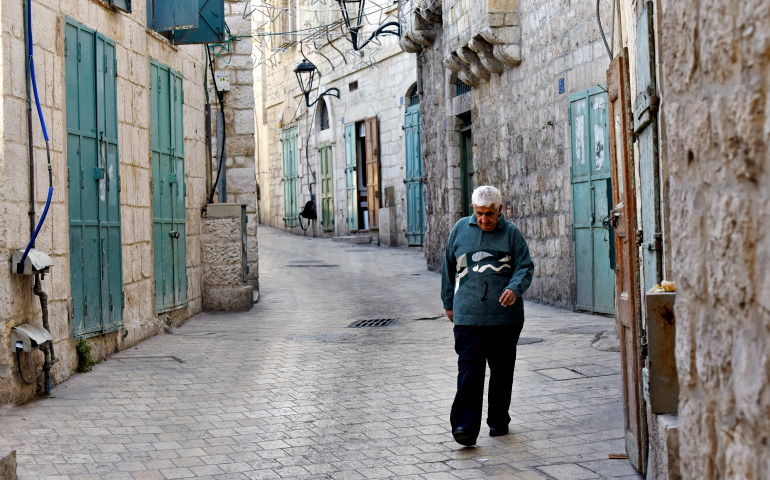
A Palestinian man walks on Star Street Dec. 5 in Bethlehem, West Bank. (CNS/Debbie Hill)
During this wonderful time of the year, when Christians throughout the world focus minds and hearts on the coming of God himself upon the earth as one of us, our attention naturally turns to the place where the Incarnation occurred.
While all the earth is a holy creation of the Almighty, Bethlehem and the surrounding lands that Jesus walked upon, taught upon, miraculously acted upon, suffered and died upon, and gloriously resurrected upon are uniquely holy, and thus deserving of the title Holy Land.
In the Holy Land, the Prince of Peace taught humanity the way to true peace.
In word and deed, Jesus showed the world that justice, merciful forgiveness, solidarity, compassion, special care for the poor and vulnerable, nonviolence and complete trust in God — not trusting in material wealth and military might — are the necessary steps we must take if we truly desire to walk the path to peace.
But sadly, so many people, corporations and governments arrogantly ignore the wisdom of the Prince of Peace — even in the Holy Land.
Catholic Relief Services' country representative for Jerusalem, the West Bank and Gaza, Hilary DuBose, explained to me that after nearly 50 years of Israeli occupation, with no foreseeable end to the conflict, and no reasonable expectation for a totally independent and viable nation, Palestinians feel hopeless.
The unemployment rate in the West Bank remains over 25 percent. And in Gaza, it's much worse.
Israel has imposed an air, land and sea blockade around Gaza. DuBose said, "On the humanitarian side, it is hampering our ability to coordinate and support our work there. Gazans themselves feel trapped, and describe their lives as if living in an open-air prison."
According to the World Bank, in 2016 the Palestinian unemployment rate reached a staggering 27 percent in the Israeli-occupied West Bank. And in Gaza, the rate was far worse at 42 percent, with youth unemployment at 58 percent.
According to the Legal Center for Arab Minority Rights in Israel, even Palestinian citizens of Israel often face discrimination in work opportunities, pay and conditions.
To help correct the discriminatory challenges faced by Palestinians, Irish-born American Fr. Sean McManus has put forth the Holy Land Principles.
The eight Holy Land Principles, in summary, call on U.S. companies operating in Israel and Palestine to adhere to equal and fair employment practices in all areas without discrimination; to actively recruit underrepresented employee groups; and to work with governmental and community authorities to eliminate ethnic, racial and religious disparities in government spending on education, training, access to health care and housing.
Please go to www.holylandprinciples.org to learn more about these important moral principles and how you can help advance them.
The International Court of Justice has declared that Israeli settlements in the occupied territories are illegal according to international law.
The ecumenical organization Churches for Middle East Peace is asking Americans to contact their two U.S. senators asking them to urge President Barack Obama to support a U.N. Security Council resolution that clearly states that all Israeli settlements are illegal. To send your senators this message, please click here.
By acting on behalf of our suffering brothers and sisters in the Holy Land, we are doing our part to keep Christ in Christmas.
[Tony Magliano is an internationally syndicated social justice and peace columnist.]
Editor's note: We can send you an email alert every time Tony Magliano's column, "Making a Difference," is posted. Go to this page and follow directions: Email alert sign-up.
